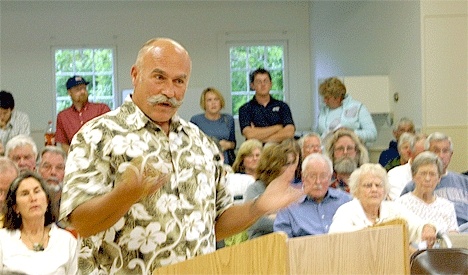A proposed “color palette,” which provides a selection of colors homeowners could use to paint their homes, is illustrative of a number of land use issues that have sparked controversy on Central Whidbey.
The color palette is part of the new design rules being considered by Island County and the town of Coupeville that apply to Ebey’s Landing National Historical Reserve. Coupeville is located within the confines of the reserve.
The Coupeville and Island County planning commissions are currently going through an extensive public hearing process to gather input on a draft of the regulations. The second public hearing took place Tuesday night at the Coupeville Recreation Hall where approximately 50 people attended.
Al Bowers joked about a way to ensure all homes on Central Whidbey Island have a similar appearance, which would solve a controversy that has erupted over color.
“Pass a resolution that no color pictures will be taken in the historical reserve,” Bowers told the planners, suggesting only black and white photos to document homes.
More seriously, Bowers said, “This commission is more interested in color than structure.”
Coupeville resident Bill Engle suggested the palette may be too colorful, noting that from a historical preservation perspective, only the color white was used by pioneer families on their homes.
Town Planner Larry Kwarsick said the color palette program is voluntary, however, any homeowner wishing to use a color outside the palette would have to seek approval before something called the Historic Preservation Commission.
Boyer and Engle were just two of the people expressing concerns about how the regulations would affect homeowners and farmers’ ability to use their property.
Jeff Tate, former Island County planning director and currently a consultant hired by the county, highlighted several issues that residents should know about the guidelines.
The new regulations propose combining Coupeville’s Design Review Board and Island County’s Historical Advisory Committee into one Historical Review Commission, which would decide permits that involve alterations to historic structures.
Kwarsick said that any decision the new commission makes would be subject to review by the town or county planning director to ensure a decision is lawful.
For smaller projects there would be two levels of administrative review, which goes through either the planning staff or a committee comprised of the town and county planning directors and the Ebey’s Reserve manager.
“What we tried to do is create a system that is predictable,” Kwarsick said.
Some people were concerned about the composition of the proposed commission. They stressed the importance that homeowners and farmers have representation on the board.
Karen Bishop, owner of Ebey Road Farm, said the color palette is the least of her concerns. She wanted to make sure the design review guidelines will allow farmers to adapt to keep their farms viable. For example, would there be language that would allow farmers to construct greenhouses?
“I think it needs a lot of work,” Bishop said, adding that farmers are busy in the fields and don’t have enough time to examine the draft. She suggested officials spend the next three to four months working on the proposal.
Other people described the regulations as more government intrusion into their lives.
William Cheaqui called the draft an “unfair insertion into the lives of people by unelected officials.”
Central Whidbey resident Jason Joiner said property owners and farmers can do a better job of preserving the reserve than any commission.
“Someone telling me what I can do with my property is stripping me of my property rights,” Joiner said.
Coupeville resident Robert Warder asked if there would be penalties for owners of historic homes who maintain their homes but don’t want to participate in the commission process.
“For 30 years, I’ve never heard a complaint about my house,” Warder said. He worries that new regulations would mean he has to be more careful about how he completes his repairs.
Central Whidbey resident Lauren Hubbard echoed Warder’s comments.
“It puts a lot of pressure on the people maintaining these historic structures over the long term,” Hubbard said.
The two planning commissions voted to continue the hearing to Sept. 15. A time hasn’t been set yet. Both planning commissions should start deliberating Sept. 29 and have a recommendation to forward to the Coupeville Town Council and the Board of Island County Commissioners, who will make the final decision.



